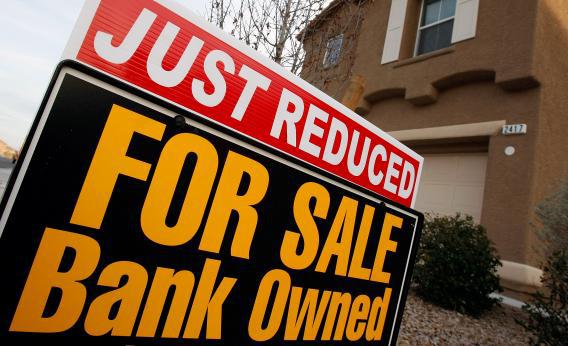Don’t forget how bad things were.
That’s the message of President Obama’s new reelection video, “The Road We’ve Traveled.” To the millions of Americans disappointed by Obama’s presidency, the video says: Things could have been much worse. In fact, they were much worse. They’re better now. Be grateful.
The video, narrated by Tom Hanks, begins with images of Obama and his family waving to supporters on election night 2008. “What do we remember in November of 2008?” Hanks asks as the camera pans the crowd’s hopeful faces. “Was it this moment? Or this?” With a thunderclap, pictures of economic collapse flood the screen: Stock prices tanking, trading floors in chaos, empty store fronts, foreclosed homes. Hanks asks: “How do we understand this president and his time in office? Do we look at the day’s headlines? Or do we remember what we as a country have been through?”
The narration is solemn and elegant. The pictures are transporting. But the object is flatly political. Obama’s operatives don’t want you to judge him by your unhappiness with your present financial situation. Nor do they want you to judge him by the high aspirations you had for him in the summer of 2008. Forget all that hopey-changey stuff. They want to reset your expectations to the weeks after his election, when the economy was going to hell.
Austan Goolsbee, the former chairman of Obama’s Council of Economic Advisers, and David Axelrod, Obama’s political strategist, describe on camera how Obama’s economic team converged in Chicago that winter. “What was described in that meeting was an economic crisis beyond anything anybody had imagined,” Axelrod recalls. Rahm Emanuel, Obama’s former chief of staff, cranks up the woe. The auto industry was reportedly “days from collapse,” says Emanuel, and the financial sector, the economy’s heart, was in “cardiac arrest.” Goolsbee says the six months surrounding Obama’s inauguration were the worst on record.
The story is dramatic, but the math is simple: Axelrod, Emanuel, and Goolsbee want to push the recession’s losses onto the books of the Bush administration. Axelrod recalls Obama’s then-economic adviser, Christina Romer, warning the president-elect in late November 2008 that “millions of people are going to lose their jobs.” Axelrod remembers Peter Orszag, Obama’s incoming budget director, predicting that the economy’s weakness would “add trillions of dollars to our debt.” Blame the red ink on Bush, not Obama. Hanks goes on to enumerate all the jobs wiped out before our hero arrived: “More than 3.5 million lost in the six months before he took office.”
But lo! Obama raised his right hand, and the sun rose. First, according to the video, came the Recovery Act, with money to keep teachers, cops, and firefighters at work. Then came job training, highway construction, and tax cuts for the middle class. Obama’s biggest move was the auto bailout. Vice President Biden spins it as a gutsy call in the face of hostile polls. Elizabeth Warren, Obama’s former adviser on consumer protection, plays up the risk of failure, noting that the auto companies could have gone under anyway, taking Obama with them. Former President Bill Clinton frets that “people have no earthly idea what would have happened” to the country if the industry had shut down. Again, the message is how much worse things could have been, and how brave Obama was, even if what he did looks in retrospect like a no-brainer.
The story of economic recovery consumes more than seven minutes of the 17-minute video. For the next three minutes, the show moves on to health care, but the economy remains the theme. Hanks reminds us how bad things were before Obamacare: “Health care costs had been rising three times the rate of inflation, crushing family budgets and choking business. And [Obama] knew that he couldn’t fix the economy if he didn’t fix health care.”
Ten minutes in, the scene shifts to Iraq. Obama promised to bring our troops home, and he did. Don’t forget that, you ingrates, the video implies. Remember when we were getting blown up over there every day? Then we’re off to Abbottabad, Pakistan, for the hit on Osama Bin Laden. Today, we know Bin Laden was in that compound and was killed without U.S. casualties. But Obama didn’t know that in advance. Again, Biden milks the suspense: “If he was wrong, his presidency was done.” The segment closes with a TV news clip that says the raid could have been “a disastrous failure.” But our leader made the tough call.
The next two minutes recount all the good things Obama has done for this or that constituency: health insurance for young adults, drug discounts for seniors, equal pay for women, ending Don’t Ask, Don’t Tell for gays. The list goes on: stem-cell research, mileage standards, renewable energy, student loans. Hanks credits the president with “raising expectations in our schools.”
For Obama, however, Hanks suggests lowering expectations. “While the economic crisis proved to be more severe than experts had predicted, month by month there was progress,” Hanks reports. “Over 3.5 million private sector jobs in two years.” On the screen, a dynamic chart shows the rate of job losses magically beginning to decline as “Obama takes office.” The chart focuses on what improved—the rate of job losses—rather than on what languished or worsened: the net job count and the unemployment rate. The color shifts from red to black at the moment of Obama’s inauguration, visually overriding the inconvenient fact that the employment ledger remained negative for more than a year.
In its final scene, the video returns to Obama and his family on election night 2008. “When we remember this moment and consider this president then and now, let’s remember how far we’ve come,” Hanks concludes. If you don’t think you’re better off than you were four years ago, you’ve forgotten how bad things were.
William Saletan’s latest short takes on the news, via Twitter:
